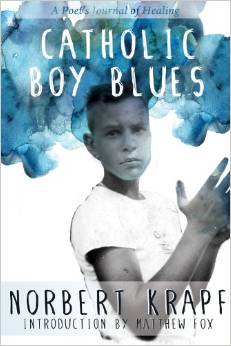 Just last month, Greystone Press released an eloquent testament to the shattering impact of childhood sexual abuse, and the power of truth-speaking in the healing process, in Catholic Boy Blues: A Poet's Journal of Healing by Norbert Krapf, past Indiana Poet Laureate, Pulitzer Prize nominee, emeritus prof. of English at Long Island University, and author of twenty-five critically acclaimed books.
In his Introduction, Matthew Fox speaks to the depth of Krapf's message:
Just last month, Greystone Press released an eloquent testament to the shattering impact of childhood sexual abuse, and the power of truth-speaking in the healing process, in Catholic Boy Blues: A Poet's Journal of Healing by Norbert Krapf, past Indiana Poet Laureate, Pulitzer Prize nominee, emeritus prof. of English at Long Island University, and author of twenty-five critically acclaimed books.
In his Introduction, Matthew Fox speaks to the depth of Krapf's message:
"The late poet Derrick Walcott, in accepting the Nobel Prize for poetry in 1992, declared that “the fate of poetry is to fall in love with the world in spite of history.” This powerful statement reminds us of the darkness that so much history contains—the wars, the injustices, the mistakes, the crimes, the malfeasance, the lies. History tempts us to give up on life. Poetry (and other art forms) are that gift from the gods that allows us to endure, to heal and to thrive in spite of history.
Lately, first in the Roman Catholic Church, and now in the football hierarchy of Penn State University, one shadow side of history, the rape and abuse of children and the cover up by powers that be, has been making headlines and telling us things about ourselves and our institutions that we prefer not to hear. Denial reigns. Adultism rules when institutional ego and reputation take precedence over the safety of children whether that institution is a university or a church. In this book, from an acclaimed poet laureate, we hear the truth that burns through denial and we pray once again that the truth will.
After armies of lawyers and (somewhat) contrite bishops and football coaches and in-denial popes there cometh the poet. A poet-victim to tell the truth, sing the truth, speak the truth, gather the truth with facts and heart and the only weapons victims have ever possessed—the truth-telling that alone leads toredemption, prevention, healing and ultimately compassion and forgiveness.
These poems tell what a steep price the soul pays for childhood abuse. How many years (over fifty in the present poet’s life) of keeping the secret; how much damage was done in his and other families, he keeps asking. What a price a community pays as well. A close-knit German Catholic community no less. Former Pope Benedict XVI would do well to take a retreat immediately with these poems in hand and read and pray these poems and then tell the world why his all-powerful office of the Holy Inquisition, responsible for wayward clergy, did not end child abuse by priests, some of whom, such as the infamous Father Maciel, were so highly favored by his boss, Pope John Paul II, who is getting canonized. And, while he is at it, let Cardinal Ratzinger (retired Pope Benedict XVI) tell the world why his office kept the lights on late at night to beat upon holy and hard-working theologians but kept mum on perverse pedophile priests.
In these poems the poet speaks the truth not just about the facts but also about the feelings. The stories. The broken lives. The betrayals. The many others also abused. The hypocrisy. The religious hypocrisy. The spiritual hypocrisy. The losses. The anger. The sadness. The grief. The distance traveled from religion, from church, from oneself.
The probing here of the depth of passion and loss (what the mystics call the “Via Negativa”) is profound. And universal. All grief speaks this way. All grief is angry and wild, sad and sorry, mute and silent, even secret. But not for ever. Breakthrough is so needed. Breakout is so important. This book is a breakout book. The truth must be spoken (not just adjudicated, not just financially reimbursed through fines in civil court). This is why Walt Whitman can say “the true Son of God comes singing his song.” The Jesus story reminds all men and women that the truer we be sons and daughters of God, the surer we will be crucified. Innocent boys, like the innocent Christ, wanted only to love life and explore it fully and, with an overly naïve and trusting parish community and sister and parents, were befuddled by the adult lies, the religious lies going on. They are, sadly, still going on. The church is not reforming or even trying to reform itself. Quite the opposite, it has slid (and even rushed) backward into a defensive mode again of superiority “beyond which there is no salvation,” a mode of authoritarianism that condemns the whistle blower, the prophet, the thinker as trouble-maker. The church is what it is, unfortunately.
But the poems live. They are organic and truthful. They speak the truth more loudly than sermons and rituals and papal bulls; more appropriately than fancy colored vestments and rote readings from holy books. They reach to the soul, to the heart, to the Spirit. They bear the mark of authentic preaching of salvation and of a living Christ of compassion...."
See the full introduction, and experience the depth of Norbert Krapf's passionate poetry, in Catholic Boy Blues: A Poet's Journal of Healing. See the growing number of rave reviews here.